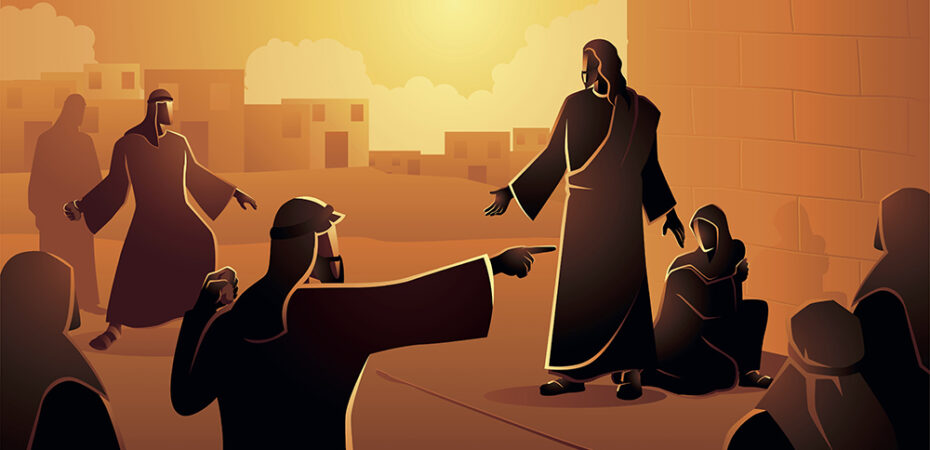Throwing Rocks
Casting away the stones of condemnation for mercy and redemption
Father Ronald Patrick Raab Comments Off on Throwing Rocks
In Lent, Jesus holds a mirror to our conscience. In John 8-11, again this year, we enter the circle with religious leaders, a silent woman and Jesus. We listen carefully to the intent of religious leaders. They are fulfilling the law of condemnation, bringing to Jesus a sinful woman. The circle becomes tight with blame. Jesus bends to the ground, silently. He pens something in the sand — message or scribble?
Jesus whispers to the circle of men, “Let the one among you who is without sin be the first to throw a stone at her” (Jn 8:7). This line from the Master’s mouth changes our notion of sin and mercy forever. Jesus stands up in the circle. The stones once held in the hands of the spiritual leaders remain on the sand. Each one dropped the accusation and the rock. Jesus’ voice penetrated their conscience. Each leader recognized their own sin lying in the sand.
As priests and pastors, as religious leaders, Jesus constantly challenges us. We often find ourselves in circles of blame, accusations, conspiracy and shame. We stand on the front line of parish life dodging rocks tossed about, of righteousness, of duty, from right and from left. We often are left holding a rock of judgment in our hands. We are also blamed for the sins of our leaders.
As pastor, I constantly examine the rock in my hand. I carry instincts of blame. I accuse our Church of coverup of clergy sex crimes. I accuse those around me of tight-lipped leadership. I accuse parishioners of believing conspiracy theories about vaccines. I want to hold a rock to throw to those on the left and to those on the right. I hold a rock to throw at other religious leaders who corral parishioners with fear.
Unfortunately, we even hold the Eucharist, our most sacred moment, as a tool for condemnation toward people we think remain unworthy. Here, we must listen to Jesus with deeper love, with ever-present attention to the Master who whispers in our conscience. Bread cannot turn to rock. Mercy is genuine food. Compassion is a full meal.
As a priest, it is not easy to listen to Jesus in this Gospel. The woman in the circle, as I tend to forget, represents any powerless person in our society. So, I examine, again, the rock. I know I have condemned, by my silence, people with disabilities. I have ignored people on death row. I even look away from the children trafficked in my state. I am silenced by people who threaten me. An eye roll becomes my rock. My cynicism becomes my stone. I cannot count the rocks I toss. I cannot imagine the stones piled up around people without power in our society, the weak ones, the fragile ones, the nameless ones, the people with no voice or notice.
However, Lent breaks toxic circles of sin. Lent unbinds us. Lent frees us from tight fists of accusations, blame and conspiracy. Lent silences our voices of hatred. Lent opens new circles of love. Lent is not just for catechumens but also for us, pastoral leaders. Lent does not lose its grace and intent, no matter how many Lenten seasons we have served. Lent is freedom. Lent is a miracle. Lent is the house of mercy, in the dying and rising of Jesus Christ.
We beg Jesus to break many circles in Lent. Circles of condemnation. Circles of accusation. Circles of blame. Circles of silence. When we reimagine our lives and our pastoral ministry in Lent, then these circles break open in love. This love leads us to Easter.
During the Easter Vigil, we bless fire in a new circle of celebration. Warmth and light replace the old condemnations within our circles. We pour water in a circle of life during baptism. We invite again the People of God to circle around the altar of Jesus Christ knowing real freedom of mercy, forgiveness and peace. This is Easter when at last the circles of prayer replace the old gatherings of accusation. Stones become bread to share.
Focusing on the nameless woman in John’s Gospel reveals the story of love once again in the many circles of pastoral life. The circles of darkness open to embrace the lost, the lonely, the sinner, in the dying and rising of Jesus Christ. As priests, we caretake the miracle of mercy. We hold in our hands Real Presence. We serve the outcast. We know the Gospel story in our own lives ready for redemption. On our journey to Easter, circles of despair become circles of joy and delight in Jesus Christ. In this mirror, we see only love.
FATHER RONALD PATRICK RAAB, CSC, serves as pastor of Sacred Heart Parish, Colorado Springs, Colorado, Our Lady of Perpetual Help Chapel in Manitou Springs, Colorado, and Holy Rosary Chapel in Cascade, Colorado.





